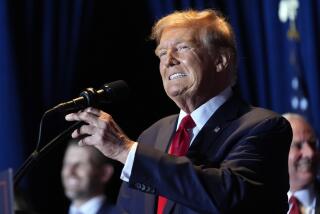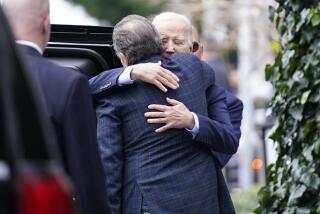McCain Pins Presidential Hopes on Fellow Veterans
- Share via
MYRTLE BEACH, S.C. — By the time Sen. John McCain arrived at the Crab House here the other night, the 30 military veterans waiting for him were getting a bit restless--and hungry. They already had seen a 10-minute video of McCain’s career and listened to a medley of patriotic tunes.
But America’s most celebrated former POW, who spent 5 1/2 years in a Hanoi prison cell, deftly worked the crowd. And by the time dinner was over, they were his.
“South Carolina loves its soldiers,” said E. Linwood Yarborough III, an investment counselor.
Enough, McCain hopes, to help power his insurgent fight for the Republican presidential nomination.
Outmanned and outgunned by Texas Gov. George W. Bush, the Arizona senator, more than any other candidate, is waging a sort of guerrilla campaign, husbanding his resources, carefully calibrating his strategy and aiming for tactical victories in a handful of key states. His secret weapon: an army of fellow veterans, inspired by his military background and extraordinary tale of personal heroism.
South Carolina--veterans make up 10% (about 400,000) of its population, the nation’s highest per capita concentration of military personnel--is a linchpin of that strategy.
“I can win this race. And the way to win the race is by winning South Carolina,” McCain said, explaining that a win here on Feb. 19 could give him the “bounce”--including a blitz of favorable news coverage--to compete successfully in California and 14 other states that will hold primaries soon after.
Such “earned media” will be vital because “even the wealthiest candidates” won’t be able to afford to buy the necessary advertising in so many states, McCain said.
McCain is working hard to boost his image in California, assiduously courting San Diego, with its heavy presence of active and retired military personnel and families. At this point, however, he is a distinct underdog to Bush in the state. In a Los Angeles Times Poll this month, the Texas governor commanded 50% of the state’s Republican votes. Only 2% of those surveyed expressed support for McCain.
About 10% of California’s residents are veterans, officials say. Although a diverse group nationally, veterans tend to be conservative and heavily Republican, particularly the retirees.
McCain campaign aides are meticulously researching, state by state, the way veterans voted in the last presidential campaign (when decorated World War II veteran Bob Dole was the GOP nominee). Later this summer, McCain will address the national conventions of the VFW and the American Legion. The hope is that word of mouth among veterans could offset the money advantage held by front-runner Bush or the deep pockets of multimillionaire publisher Steve Forbes.
So far, the strategy shows signs of paying off.
Bill Dickey, 55, a VFW post commander and retired Air Force master sergeant, has never involved himself in GOP affairs before. But by the time McCain sat down across the table from him at the Crab House dinner, Dickey was sporting a “McCain 2000” sticker on his shirt.
So was L.D. “Lyn” Dimery, the next VFW state commander. He too is a political neophyte but decided to support McCain after hearing the senator speak. “We need a man that’s been there, done that.”
Apart from McCain’s strategy, South Carolina is emerging as a crucial battleground in the GOP nominating fight because its primary will take place shortly after the Iowa caucuses and the New Hampshire primary.
A recent poll of more than 700 registered voters in New Hampshire, conducted by the Boston Herald and WCBS-TV, showed McCain and Elizabeth Hanford Dole tied for second place, at 11%, behind Bush’s 45%.
As for Iowa, McCain’s advisors believe he might do no better than fourth or fifth, even if he devotes considerable time and money to the state. He has been outspoken in his opposition to ethanol subsidies, which are popular in Iowa, and has antagonized many within the Christian right, an influential force in the state caucuses.
So South Carolina, with its abundance of monuments to heroes going as far back as the Revolutionary War, looms large in McCain’s game plan.
“This is a make-or-break state for us,” said Trey Walker, former executive director of the South Carolina Republican Party and now a McCain operative.
When McCain first returned from Vietnam, he was loath to talk about his POW ordeal, which began in 1967 when his Navy jet was hit by a surface-to-air missile during a bombing sortie over Hanoi. Even now, he tells audiences: “It doesn’t take a hero to get shot down.”
But as he campaigns, he is granting audiences a peek into the defining experience of his 62 years. Here he told of the nightly ritual of pledging allegiance to a flag sewn by a fellow POW as they stood under a bare lightbulb.
McCain’s autobiography, due out in September, will include “abundant” new details about his captivity and torture at the hands of the Vietnamese, one aide said.
McCain intends to formally declare his candidacy right after his nationwide book tour. He had planned to announce in March but thought it would be unseemly to launch a partisan political campaign as the nation was going to war in Kosovo--a decision that cost his campaign about $100,000 in cancellation fees for things such as hotel reservations and airplane charters.
It is the kind of principled if maverick stand for which McCain is known. And that independent streak has not deserted him on the campaign trail.
While denouncing pork-barrel spending, for instance, he said that, as president, he would go on TV to name every offending lawmaker and his or her pet project. “I’m going to make them famous,” McCain vowed as a roomful of veterans murmured approvingly.
Running as a reformer, McCain pledges to reduce the ability of special interests to make unlimited campaign contributions.
“It’s corrupting America. It’s corrupting the process,” said McCain, who with Sen. Russell D. Feingold (D-Wis.) sponsored failed legislation to reform campaign finance laws. “It’s got to be stopped.’
Besides vowing to build up the military and to preserve Social Security and Medicare, he tells audiences that he would focus on these foreign policy issues: the proliferation of weapons of mass destruction; the rise of Islamic fundamentalism and tribal and ethnic conflicts; and the rise of China as a superpower.
Already, 12 state legislators in South Carolina who earlier this year had urged Bush to run, have changed course, unequivocally endorsing McCain.
“The most dramatic contrast we have to the Clinton era is John McCain,” said South Carolina House Speaker Pro Tem Terry Haskins. “He’s a national hero known as a leader who tells the truth.”
Still, courting the veterans, even in veteran-rich South Carolina, may not be enough to dislodge Bush.
McCain’s visit to South Carolina last week was going swimmingly--until he reached Columbia, the state capital.
Pulling into the Clarion Townhouse Hotel, where Bush had held meetings just hours earlier, McCain saw on the marquee: “Welcome Gov. and Mrs. George W. Bush.”
A second reminder of Bush’s towering shadow in the state came the next afternoon in the bustling lobby of the Statehouse during a news conference called to announce the endorsements of McCain by 17 lawmakers, most of whom had been leaning toward Bush.
As McCain stepped up to the microphone, the sound system was cut off--decreed by pro-Bush legislative leaders who said that amplified speech would disturb the two houses, which were in session nearby.
Yet McCain seemed oddly in his element as he struggled to be heard.
“I’m running on reform,” he tried to tell reporters over the din of a room teeming with lobbyists. “I’m running against the status quo.”
More to Read
Get the L.A. Times Politics newsletter
Deeply reported insights into legislation, politics and policy from Sacramento, Washington and beyond. In your inbox twice per week.
You may occasionally receive promotional content from the Los Angeles Times.










